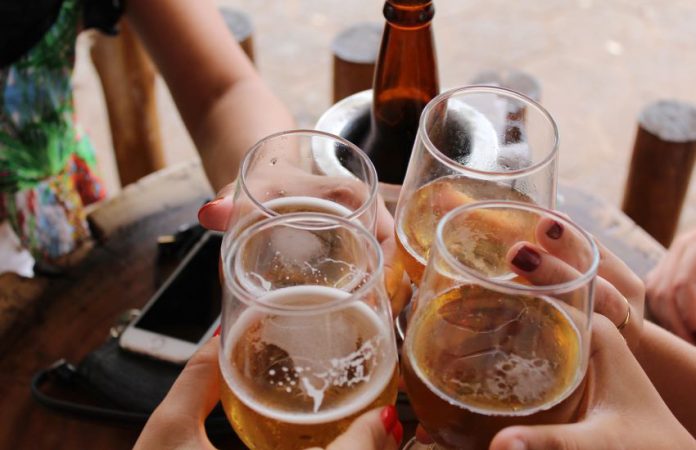I was 20, a month away from 21, when I first came to Mexico on an exchange program.
Living in a college dorm room for the previous three years over 1,000 miles from my family had already given me a taste of quite a few new freedoms. But attending college on a small “dry” campus in a town with only one bar, drinking was not one of them.
Not that the desire was on my radar in any kind of serious way. I grew up in a family where pretty much nobody drank, ever. It’s not that they were alcoholics and working to abstain. Alcohol just was never a part of the picture, those kinds of vices being something for far more troubled types — the kinds of people who screamed at their kids in front of everybody in grocery stores or obnoxiously kept the neighbors awake with whoops and hollers at 2 a.m.
The implication of this understanding was that where alcohol was involved, any manner of terrible things could and did happen. Nobody would be safe if there were drunk people around.
Imagine my surprise and low-grade degree of alarm (that I tried very hard to hide), then, when I arrived in Mexico and saw both my teachers and classmates order beer to drink with their regular meals — and often — like it was nothing.
Oh no.
Fortunately, the scary, maniacal behavior that I was somehow prepared to expect never materialized. Eventually, I thought to myself, Well, when in Rome … and started ordering alcoholic drinks myself every once in a while. I found that I enjoyed the pleasant buzz and suddenly easier conversation, a boon for someone who was naturally reserved and easily prone to embarrassment like me.
It took me a while to like beer, though. Granted, at the time, I didn’t know any better and drank a lot of Sol and Corona. They are what they are, and many people like and appreciate them.
Since that year of learning to enjoy as well as moderate alcohol (after a bit of trial and error, of course), both my puritanical assumptions and my palate have changed quite a bit.
One thing that I don’t think most Mexicans realize about the United States is that it’s actually a much more socially conservative place, on average, than entertainment or Spring Break exports would have them believe. After all, I wasn’t part of a commune or super-religious community. I can’t have been the only kid that grew up with those assumptions about alcohol.
And while I don’t have the numbers to back me up on this, my own observations from living in Mexico for the past 19 years have made it clear to me that moderate, social, casual alcohol consumption is not considered the deviant behavior that it was where I come from. Kids are sent to the store to fetch more caguamas (liter bottles of beer) during family gatherings; drinks seem to be present at every party, something special to be shared.
And while I don’t encourage people to get totally wasted, it’s refreshing not to see worried glances across the room when alcohol is served.
The value put on alcohol here was made especially clear to me when, during quarantine, owners of small businesses argued that beer was actually an essential product. The later sometimes-dry laws and limits on consumption were frustrating, and black market sales reached fairly ridiculous heights during those first few months of the pandemic.
Thankfully, after a while of limiting the purchase of any kind of alcohol to certain days and times — which felt like a halfway prohibition on top of everything else — it’s back on the collective table.
And now that it is, I’m not taking it for granted. Over the past year, I’ve especially come to love and appreciate rather high-end artisanal beer, and it’s become quite an innovative industry that is growing just as much in my city of Xalapa as in other more established brewing areas of Mexico. We’ve got several delicious homegrown brews now, and it seems that more are frequently being added.
Heartening too is the growth of women-owned breweries across the country. I’ve thought about them a lot lately as I myself have recently turned from beer fan to beer fan and beer brewer (involving a blackberry English porter that is just lovely and that I am very proud of). Might I one day join their ranks?
As my partner likes to say, beer is noble. It gives back to you what you put in. And when something is truly special, a deepening understanding of its complexity will inevitably lead to a deepening love and appreciation as well.
Granted, it might also lead to increased levels of snobbish attitudes — it certainly has in my own case — but it’s to be expected: once you’ve read Isabel Allende, after all, it’s hard to look at the Twilight series in the same light.
For now, I’m just glad I have so many delicious, local and innovative choices, as well as the possibility of creating brand-new recipes. Because even when the world is falling apart, we’re called to appreciate beauty and be creative.
So, this week, let’s take a break from politics, the economy, the coronavirus. The problems we have matter, but I’d be willing to bet that even Angela Merkel kicks back with a celebrity magazine and something bubbly once in a while.
Let’s not forget to do the same; it’s been a rough year, and we’ve earned the right to let ourselves experience a little magic once in a while.
Salud, my friends.
Sarah DeVries is a writer and translator based in Xalapa, Veracruz. She can be reached through her website, sdevrieswritingandtranslating.com.
